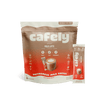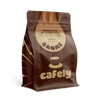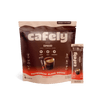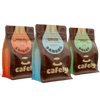Keto coffee is a high-fat, low-carb beverage tailored for those following the ketogenic diet. It may provide long-lasting energy, promote mental clarity, and aid in weight loss when consumed correctly.
In this guide, you'll learn what keto coffee is, its potential benefits, how to make it, and more…
What Is Keto Coffee?

Keto coffee is a beverage tailored to the ketogenic diet — a lifestyle diet that involves eating high-fat and low-carb. By cutting out carbs, your body goes into a state of “ketosis,” converting fat to ketones, which it uses as an energy source. Many people follow the keto diet to improve weight loss, energy levels, and mental clarity.
The ingredients in keto coffee can vary, but two main rules apply — the beverage should contain a healthy fat source and no (or very few) carbohydrates. On top of this, it should be made with high-quality, freshly ground coffee beans and the fat source should be nutritious — grass-fed butter is a popular option.
Two main types of keto coffee are popular among followers of the diet:
- Butter Coffee — This brew’s ingredients are in its name; coffee and grass-fed butter. Mixing these ingredients creates a creamy, oily brew with plenty of healthy fats. People on the keto diet love it for the extra morning calories for sustained energy.
- Bulletproof Coffee — Bulletproof coffee combines freshly brewed black coffee with grass-fed butter and MCT oil. It was invented by Dave Asprey, who promotes the beverage for its ability to provide prolonged energy during ketosis and a long list of potential health benefits.
Nutritional Profile of Keto Coffee
The nutritional profile of keto coffee is vastly different from regular black or white coffee. Although the caffeine levels are the same, the total calories, fat, and protein are worlds apart.
The average cup of keto coffee contains well over 300 calories and more than 35 grams of fat — consuming this beverage regularly while on a normal (non-keto) diet could lead to significant weight gain. It’s best to avoid keto coffee if you follow a regular, balanced diet.
With that said, here are the nutritional profiles of butter and bulletproof coffee:
Butter Coffee
Nutrient profile of keto butter coffee (one cup of black coffee mixed with three tablespoons of butter):

Bulletproof Coffee
Nutrient profile of keto bulletproof coffee (one cup of black coffee, three tablespoons of butter, and three tablespoons of MCT oil):

What Are the Benefits of Keto Coffee?
Advocates of the ketogenic diet claim that this coffee blend provides several benefits, supporting the low-carb, high-fat lifestyle and health in general. However, while some research backs up these claims, much of the evidence is anecdotal.
With that said, here are the potential benefits of keto coffee:
1. Provides Long-Lasting Energy
The caffeine in keto coffee provides an instant energy boost. This stimulant temporarily blocks adenosine — a neurotransmitter responsible for the “tired” feeling. After drinking, you’ll immediately get a feeling of wakefulness and increased energy.
The healthy fats from the butter and MCT oil (if used) also provide a sustainable energy source for people in ketosis [1]. These fats take longer to break down and provide a steady energy release throughout the day, potentially eliminating the “caffeine crash.”
The combination of caffeine, butter, and MCT oil in this drink may provide a fast-acting “boost” and prolonged energy throughout the day. Drinking this brew regularly could improve endurance and make it easier to go about everyday activities while following a ketogenic diet.
2. Helps With Weight Management
Keto coffee may support weight loss and management by promoting fat-burning and reducing food cravings. The high-fat content in the drink keeps you fuller for longer.
MCT oil, in particular, has been linked to increased fat-burning and metabolism, making it a useful ingredient for those who wish to lose weight [2]. Furthermore, the caffeine in coffee has also been linked to increased fat-burning [3].
Caffeine can boost metabolic rate and provide energy for physical activity while suppressing hunger pangs. This ability to curb hunger and provide energy for exercise can make it easier to remain in a calorie deficit — essential for weight loss.
3. Improves Digestion
Keto coffee may benefit digestion and gut health in a few different ways. Let’s take a look at a few:
- Antimicrobial properties — MCT oil may help maintain a healthy gut biome and promote the growth of healthy gut bacteria [4]. Certain beneficial gut bacteria thrive on a high-fat diet, such as keto. Providing the gut with healthy fats from MCT and grass-fed butter may improve digestion and overall gut health.
- Mild laxative effect — Keto coffee may also help improve digestive issues such as constipation, a problem many people following the ketogenic diet experience. MCT oil and coffee have mild laxative effects, which can help encourage regular bowel movements [5]. However, consuming too much MCT oil (or coffee) at once may lead to gastrointestinal discomfort and diarrhea. Start with a small amount of MCT oil to see how it affects your digestion.
- Stimulate bile production — The healthy fats in grass-fed butter help your body produce bile [6]. This can aid in digestion and the absorption of fats during ketosis. Following the ketogenic diet may also reduce inflammation in the gut, which can improve digestion and reduce bloating and gastrointestinal discomfort.
4. Enhances Mental Clarity
When the body consumes carbohydrates and sugars, the brain relies on glucose as an energy source. On the ketogenic diet, however, glucose isn’t available, so the body and brain shift toward using ketones (derived from fats) as an energy source instead.
MCT oil is rapidly converted to ketones in the liver, providing the brain with an instant energy source. At the same time, your body converts the more complex healthy fats in butter more slowly for a longer-term energy source. These fats are an efficient fuel source for your brain for cognitive function, leading to a potential improvement in focus and alertness.
These ketones also help support the production of neurotransmitters such as acetylcholine, which play a vital role in memory, learning, and overall cognitive performance [7].
On top of this, the caffeine in coffee may also enhance mental clarity and cognitive function. This well-known stimulant may improve concentration, reaction times, and mood. When combined with the potential brain-boosting benefits of ketones, it may enhance cognitive performance.
What Do You Need to Make Keto Coffee?
You don’t need much to make keto coffee. However, the quality of the ingredients is important if you want to drink this beverage for its potential health benefits. In this recipe, we’ll be making bulletproof keto coffee — skip the MCT oil if you want to make butter coffee.
Here’s what you’ll need to make keto coffee:
Ingredients
- High-Quality Coffee — Opt for a high-quality, whole-bean coffee to make keto coffee. Whether you choose arabica, robusta, or a blend is your choice.
- Water — Use fresh, filtered water.
- Butter — Organic, grass-fed butter is the best option.
- MCT Oil — Use medium-chain triglyceride (MCT) oil from a sustainable, organic source.
Equipment
- French Press — A French press or another immersion brewer, such as the Sowden SoftBrew or Espro Press, is a good option for making keto coffee.
- Coffee Grinder — The best keto coffee is made with whole beans, so you’ll need a burr or blade grinder to process whole-bean coffee.
- Weighing Scale — Use a weighing scale (or coffee measure) to accurately portion your coffee.
- Measuring Cups — A tablespoon or 15 mL measuring cup is needed to measure the butter and MCT oil accurately.
- Blender — You’ll also need a blender to combine the ingredients and produce a creamy, latte-like consistency.
- Serving Cup — Use your favorite coffee mug or a heat-proof glass to serve the final brew.
Coffee Recommendations
The quality of the coffee you use to make keto coffee is important if you want to receive the potential health benefits of this drink. Whole-bean coffee is essential if you want to produce a brew that’s as high in antioxidants as it is in flavor.
The best keto coffee is made from high-quality, whole-bean coffee that’s sourced from sustainable organic farms and is certified mold-free. The type of beans you choose is up to you.
You have three main choices:
- Arabica — Select a 100% arabica coffee such as Cafely DaLat if you enjoy smooth, naturally sweet coffee with a mild caffeine content.
- Robusta — Select a 100% robusta coffee such as Cafely HaNoi if you enjoy dark, bold, slightly bitter flavors and high caffeine content (around twice that of arabica).
- Blends — Select a robusta and arabica blend such as Cafely Saigon OG for a balance of both beans.
How to Make Bulletproof Keto Coffee: Step-by-Step Guide
Making keto coffee is relatively quick and easy. It’s almost as simple as making a regular coffee, but there are a few additional steps.
Here’s how to make bulletproof keto coffee in six simple steps:
1. Boil a Kettle of Water

First, fill a kettle with fresh, filtered water and boil it. You’ll need around 220 mL per serving.
2. Measure & Grind Your Coffee
Next, you’ll need to measure and grind your whole-bean coffee to a coarse grind — similar in consistency to unrefined sea salt. Whole-bean coffee provides the highest antioxidant levels and the best flavor. If you can’t use whole-bean, choose a high-quality pre-ground coffee.
The amount of coffee you need depends on the number of servings of keto coffee you wish to make.
Use the table below to work out how much coffee and water you’ll need:

3. Add the Coffee and Water to Your French Press

Add the desired amount of ground coffee to the bottom of your French press. Then, pour in the required amount of hot water. Place the lid on the press, but don’t plunge just yet.
4. Brew the Coffee

Let the coffee brew for four to five minutes. The longer you leave the coffee to steep, the stronger and more bitter the coffee will be.
Once you’ve allowed time for the coffee to brew, slowly and gently push the plunger through the coffee to separate the grounds.
5. Blend the Ingredients

In a blender, add your coffee followed by three tablespoons of organic, grass-fed butter and three tablespoons of MCT oil (per serving).
Blend the ingredients for around 30 seconds to thoroughly combine them. The resulting beverage should have a creamy, frothy appearance.
6. Serve and Enjoy

Pour your keto coffee into a coffee cup or heat-proof glass. Enjoy as part of breakfast or throughout the day when you need an energy boost.
FAQs: Keto Coffee
Do you want to learn more about keto coffee and other brews you can drink on this diet?
Check out the answers to the FAQs below...
1. What Does Keto Coffee Taste Like?
Keto coffee tastes different depending on exactly how it's made. When made with butter and MCT oil (bulletproof keto coffee), it has a rich, creamy flavor with a frothy, oily mouthfeel.
2. Can I Drink Keto Coffee When Not in Ketosis?
Although you can drink keto coffee when not in ketosis, it's not recommended. Keto coffee contains a high amount of fat in the form of butter. Although healthy fats are a brilliant energy source when in ketosis if you're not following a low-carb diet, those extra fats can contribute to additional calorie intake.
If you want to consume keto coffee while on a regular, balanced diet, do so in moderation to avoid excessive fat intake and weight gain.
3. How Many Calories Are in a Cup of Keto Coffee?
The amount of calories in a cup of keto coffee depends on how much butter and MCT oil you use. The average 8 oz (240 mL) cup of keto coffee can contain anywhere from 200 to 500 calories. This high-calorie count can be beneficial when in ketosis, but it can contribute to excessive weight gain when following a regular (non-keto) diet.
4. How Much Caffeine is in a Cup of Keto Coffee?
The amount of caffeine in a cup of keto coffee varies depending on the bean type, coffee-to-water ratio, and extraction time used to make the brew. The average 8 oz (240 mL) cup of keto coffee made with arabica beans has anywhere from 60 to 200 mg of caffeine.
5. Can I Make Keto Coffee Without MCT Oil?
Yes, you can make keto coffee without MCT oil. Simply adding butter to black coffee can provide energy in the form of healthy fats which can benefit ketosis. However, many people reported greater effects from the drink by adding MCT oil due to its rapid absorption and conversion to ketones.
6. Can You Drink Regular Coffee While on Keto?
Yes. You can drink regular coffee while on keto as long as it's unsweetened and served black (or with little milk). There's almost no sugar or carbohydrates in fresh black coffee, so it won't kick your body out of ketosis.
7. Can You Add Milk to Coffee While on the Keto Diet?
Yes, you can add milk or cream to coffee while on a ketogenic diet. However, dairy does add some carbohydrates in the form of lactose. You’ll have to keep track of your daily intake to make sure you stay under your daily carb limit.
8. How Can I Sweeten My Coffee While on a Keto Diet?
Although the ketogenic diet calls for no sugar or carbohydrates, it is possible to sweeten your coffee while remaining in ketosis. Opt for a low-carb sweetener such as monk fruit, stevia, or erythritol. Make sure to track the carb content of the sweetness you use to avoid going over your daily limit.
9. What’s the Best Coffee for Making Keto Coffee?
The best coffee for making keto coffee should be high-quality, mold-free, and freshly ground. Whether you opt for arabica or robusta, a dark or light roast is down to you. Arabica coffee is naturally sweeter and has a mild caffeine content. Robusta is much more intense and has a stronger caffeine content.
10. Can I Drink Coffee While Fasting?
Yes, you can drink coffee while on a fast. Drinking unsweetened, black coffee won't break a fast because it doesn't contain enough calories. Avoid adding milk, sugar, or an alternative sweetener to coffee while fasting — this will cause a blood glucose spike and break your fasted state.
References:
- Dowis, K., & Banga, S. (2021). The potential health benefits of the ketogenic diet: a narrative review. Nutrients, 13(5), 1654.
- Mumme, K., & Stonehouse, W. (2015). Effects of medium-chain triglycerides on weight loss and body composition: a meta-analysis of randomized controlled trials. Journal of the Academy of Nutrition and Dietetics, 115(2), 249-263.
- Tabrizi, R., Saneei, P., Lankarani, K. B., Akbari, M., Kolahdooz, F., Esmaillzadeh, A., ... & Asemi, Z. (2019). The effects of caffeine intake on weight loss: a systematic review and dose-response meta-analysis of randomized controlled trials. Critical reviews in food science and nutrition, 59(16), 2688-2696.
- Rial, S. A., Karelis, A. D., Bergeron, K. F., & Mounier, C. (2016). Gut microbiota and metabolic health: the potential beneficial effects of a medium chain triglyceride diet in obese individuals. Nutrients, 8(5), 281.
- Kang, Y., & Yan, J. (2024). Exploring the connection between caffeine intake and constipation: a cross-sectional study using national health and nutrition examination survey data. BMC Public Health, 24(1), 3.
- Dam, H., Kruse, I., Jensen, M. K., & Kallehauge, H. E. (1967). Studies on Human Bile II: Influence of two different fats on the composition of human bile. Scandinavian Journal of Clinical and Laboratory Investigation, 19(4), 367-378.
- Cantrell, C. B., & Mohiuddin, S. S. (2020). Biochemistry, ketone metabolism.










